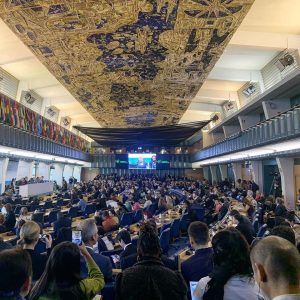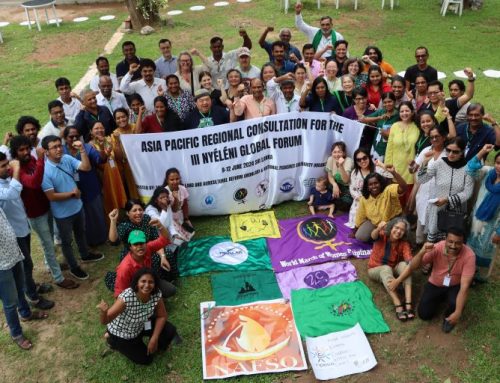 In late February, governments and civil society organisations, along with NGO and private sector representatives convened in Rome to discuss the Zero Draft of the Post-2020 Global Biodiversity Framework. The Framework will set the targets and directions for addressing an urgent problem – the ongoing loss of biodiversity that is crucial to the landscape functions that we rely on for food, fibre, fuel, and clean water.
In late February, governments and civil society organisations, along with NGO and private sector representatives convened in Rome to discuss the Zero Draft of the Post-2020 Global Biodiversity Framework. The Framework will set the targets and directions for addressing an urgent problem – the ongoing loss of biodiversity that is crucial to the landscape functions that we rely on for food, fibre, fuel, and clean water.
AFSA President Tammi Jonas joined these discussions as part of the International Planning Committee on Food Sovereignty. The IPC has called for more ambitious and transformative targets to be set for the post-2020 framework, noting that while many governments and civil society organisations support a more transformative agenda, this has yet to be included in the draft Framework. AFSA, along with the IPC and many grassroots movements, urges the parties to adopt targets that will lead significant, widespread, and transformative action to halt biodiversity loss and crucially, to recognise the major contribution of agroecology and ecologically-sound farming to maintaining global biodiversity.
See the full statement of the IPC below
(AFSA members’ participation in these events is funded by the IPC via U.N. funding mechanisms)
Declaration of the IPC on the Zero Draft of the Post-2020 Global Biodiversity Framework
The International Planning Committee for Food Sovereignty (IPC) is an autonomous platform representing 6000 grassroots organizations and social movements of Indigenous Peoples and small-scale food producers involved in the conservation, sustainable use, development and governance of agricultural biodiversity, which is the basis for food sovereignty.
Agricultural biodiversity is guaranteed by the women and men of the world who are peasants, small-scale farmers, pastoralists, artisanal fishers, forest dwellers, indigenous peoples and other small-scale food producers who feed the world. The targets of the Post-2020 Biodiversity Framework cannot be achieved unless the role and the individual and collective rights of the Indigenous peoples, who have distinct rights guaranteed in the Declaration on the Rights of Indigenous Peoples, and small-scale producers, who have distinct rights recognized in the Declaration on the Rights of Peasants and Other People Working in Rural Areas, with particular regard for women and youth, are recognized and protected. People must be allowed to live in rural areas in harmony with nature, as indigenous peoples and local communities do while enhancing the world’s biodiversity.
Our first comment on the Zero Draft is that while our people grapple with the worst impacts of the climate crisis induced primarily by industrial agriculture and extractive industries, this draft strategy to protect & conserve biodiversity in perpetuity is worryingly lacking in ambition. While the draft itself acknowledges the need for transformative change, it fails to deliver the ambitious goals and targets needed to achieve this.
One example of the lack of ambition in the draft is the reference to ‘no net losses’ – at a time when we are losing the very biodiversity on which our lives depend, this draft proposes that industries may still choose to wipe out biodiversity in one forest so long as somewhere else somebody is planting trees. We call on parties to reject this weak approach to securing the aims of the Convention to conserve biological diversity, and instead to set targets for no losses. We further note that this is emblematic of the growing movement to put a price on nature – such as so-called ‘nature-based solutions’, with the attendant damaging practices of speculating within new markets around carbon and soon perhaps, biodiversity, to its detriment.
Moreover, the zero draft fails to address issues of land tenure in an adequate way. The Post-2020 Global Biodiversity Framework should set targets to strengthen the legal recognition and protection of peasants’ and indigenous peoples’ tenure rights and systems, in particular those currently not protected by law.
We call upon parties to ensure that the Post-2020 Global Biodiversity Framework reaffirms the precautionary principle and contains concrete guidance to parties about how to protect biodiversity and peasants’ and indigenous peoples’ rights in the context of technologies, in particular biotechnologies and digital technologies. This should include to implement effective measures at national level to identify, prevent and manage any potential or real adverse impacts effects of biotechnology and new and emerging technologies on biodiversity, taking also into account risks to human health. We were disappointed to hear parties with powerful biotechnology interests assert that the Framework should recognize the alleged positive benefits of biotechnology, when the only demonstrated benefit of biotechnology has been to create profit for a select few.
We note that small-scale food producers, also called ‘peasants’, are defined in the UN Declaration on the Rights of Peasants and Other People Working in Rural Areas as any person engaged in artisanal or small- scale agriculture. However, neither the CBD nor the post-2020 Global Biodiversity Framework specifically acknowledge the rights of peasants, in spite of the fact that they produce 70% of the world’s food on 30% of its land, therefore having a critical role in preserving biodiversity.
The industrial food system, from production to consumption, is one of the main causes of biodiversity loss and the destruction of ecosystems. A transition to more diversified and sustainable systems of food production is therefore urgent. Through agroecological production and management, peasants, fishing communities, pastoralists, and indigenous peoples preserve and enhance biodiversity. Agroecology is based on the rights of small-scale food producers, indigenous peoples and communities, in particular rights to seeds and biodiversity, as well as rights on knowledge, innovation and practices. We question what special interests have made it so difficult to include explicit recognition of the critical role of agroecology in the zero draft of the post-2020 Biodiversity Framework.
At the recent meetings in Rome, we have had renewed hope, having heard many Parties recognize the role of agroeocology as the most sustainable means of providing biodiverse, nutritious, and culturally-determined food to millions of people and communities around the world. It is also urgent to recognize the unique role of small-scale food producers in the management and sustainable use of biodiverse ecosystems.
The industrial food system and extractive industries are the primary causes of climate change, biodiversity loss, and the destruction of ecosystems, as witnessed in the recent devastation of over 16 million hectares of Australian forests and farmlands. A transition to more diversified and sustainable systems of food production and a rapid transition away from unsustainable energy, manufacturing, and transport industries is therefore urgent. Setting targets that increase the areas controlled and managed by Indigenous Peoples and small-scale food producers is one sure way to reverse the biodiversity losses the world is currently suffering, and we are relying on the governments of the world to show the vision needed to deliver a biodiverse and sustainable future for all.
Finally, we sadly must highlight how difficult it was for non-English speaking peoples to actively participate in the second Open-Ended Working Group for the Post-2020 Global Biodiversity Framework processes, where the future of their land, rivers, and seas was addressed without interpretation.
We ask that Parties to this Convention who have been similarly excluded from the work of the Contact Groups to join us in demanding interpretation at all future meetings to ensure full participation of all countries and civil society in this critical work.



